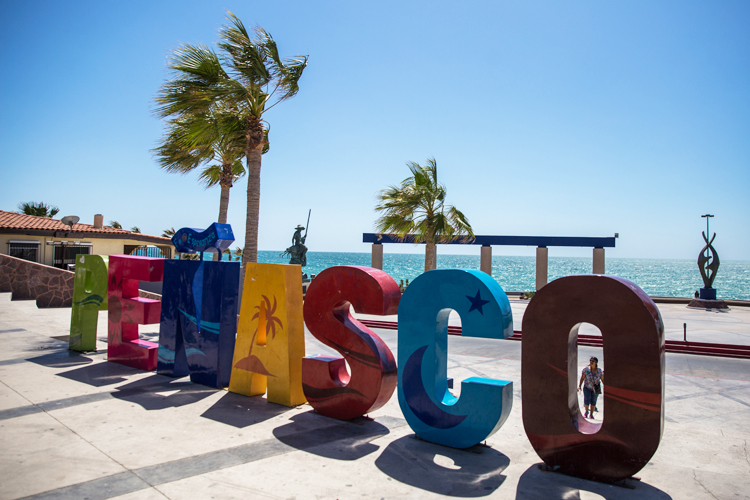When Jessica Pacheco started working for APS in 1997, she immediately learned how important Arizona’s neighbor to the south was to the state – and what potential economic opportunities existed between Arizona and Mexico.
“My first trip on behalf of the company to a community outside of Maricopa County was to Douglas,” recalls Pacheco, vice president of state and local affairs for APS. “Spending some time with local officials and local business leaders and talking through the importance of the border relationship, the importance of border infrastructure, the importance of transportation infrastructure, I saw how critical those things were to Arizona achieving its economic goals.”
Since then, Pacheco says, “It’s been on fast forward.”
Now president of the board of directors of the Arizona-Mexico Commission (AMC), Pacheco talked with Az Business about the importance of the relationship between Arizona and Mexico and what it means to the business community.

Az Business: How do you view the current relationship between Arizona and Mexico?
Jessica Pacheco: The current relationship between Arizona and Mexico is exceptional. We have a relationship between Arizona Gov. Doug Ducey and Sonora Gov. Claudia Pavlovich and Gov. Ducey and the federal government in Mexico that is better than it’s ever been before at any time in our history. It’s been a drive of this governor — supported by the business community and our border communities — to ensure that our story is told and we focus on the areas of commonality and agreement, which is the vast majority of issues and situations that we have to deal with. There is a tremendous amount of mutual respect, admiration and willingness to collaborate and work together.
AB: What are some examples that illustrate the collaborative environment?
JP: From a security standpoint, the Highway Safety Corridor between the Arizona border and Rocky Point is a great collaboration between our two states. There’s Unified Cargo Processing, which was a pilot program that began here in Arizona, which is the co-location for customs. With Unified Cargo Processing, a commercial truck shipment will go through Mexican and U.S. Customs at the same time, which really expedites the process. It’s been a tremendous partnership between Arizona, U.S. Customs and Border Protection, and the Mexican federal government. We have numerous types of collaborations that start off as potential pilot projects and evolve into national best practices.
AB: How did you become involved with the Arizona-Mexico Commission?
JP: APS serves the majority of our border communities, which are important parts of our service territory and those are growing economies and growing communities. The relationship with Mexico is important in that geographic region, so that’s how I initially became involved. Since then, understanding how important the relationship is to the entire state and taking what is happening in the microcosm of the border communities to a broader platform has been my goal since I became involved with the AMC.
AB: How does the Arizona-Mexico Commission fit into the state’s international trade efforts?
JP: The AMC is vitally important in helping Arizona establish, nurture and expand its relationships within Mexico, so it’s been front and center in creating opportunities for businesses to engage with one another, for government officials to engage with one another, and for local community leaders to engage with one another. What the AMC has really been able to do is set a standard – a national best practices – for any international relationship that Arizona is going to have, whether it’s with Israel or China or Europe. The model has really been established at the Arizona-Mexico Commission.
AB: How do the AMC and Arizona’s relationship with Mexico impact Arizona’s economy?
JP: It’s not enough to lead with our numbers. It’s not enough to just talk about the $16.6 billion in trade value we have with Mexico or the 228,000 jobs that are directly supported by our trade with Mexico or the fact that those number are up 7.7 percent over 2017. Those numbers are great, but what we want to do is take that and enhance it through relationships.
AB: What do you consider as the Arizona-Mexico Commission’s greatest accomplishments over its first 60 years?
JP: First and foremost, just surviving 60 years through different political administrations and through different national appetites and tenor in regards to the relationship with Mexico is an amazing accomplishment. Then, it goes back to the dedication to the people who engage in our committee infrastructure on both sides of the border, the folks who are living this day in and day out and want real-world, workable solutions to challenges they might have in that region. The heart of the Arizona-Mexico Commission is personal relationships and the one-on-one connections. It’s being able to pick up the phone and say, “Hey, we have a challenge. How can we work through this together to find a resolution?”
AB: How much of an impact do events like the Mexican ambassador’s recent visit to Phoenix and the AMC’s summits impact Arizona’s relationship with Mexico?
JP: They’re wildly significant. I cannot emphasize enough how much leadership Gov. Ducey has shown in this space. It takes a tremendous amount of diplomatic skills to be able to navigate the new Mexican administration – President Andrés Manuel López, his ambassador and his secretary of state – and at the same time be able to navigate the administration in the United States as well. The level of understanding, being able to manage nuances, engaging productively, focusing on what works and resolutions that we have at the highest level of our state is really tremendous. It’s evidenced by the ambassador coming here, by the warm reception and valuable conversation she and the governor shared, and her outreach to get the governor’s advice and guidance. On multiple levels, we see that his thoughtful approach to leadership — that is based in the business community — in approaching some of these challenging public policy conversations has really borne a tremendous amount of fruit for Arizona.
AB: How does the United States-Mexico-Canada Agreement (USMCA) position Arizona to lead in a global economy?
JP: First and foremost, the USMCA must be ratified. We need Congress not to play partisan politics with this. There is not a state in this country that does not benefit from the USMCA agreement. NAFTA was something that needed to be updated, particularly with the evolution of new industries. USMCA is an agreement that sets up a platform that allows us to engage and exchange with our neighbors in both Canada and Mexico productively and to grow the economy in Arizona and in the United States. Through this agreement, we will only be expanding and deepening our business relationships with Mexico and Canada and that only creates a greater position of strength. The more economically prosperous we are and the more economically prosperous our neighbors are, the better our foundation will be to have this conversation with the world.
AB: How do you see the relationship between Arizona and Mexico boosting our state moving forward?
JP: A healthy, strong, vibrant relationship between the State of Arizona and country of Mexico only enhances our economy and only enhances our prosperity. It’s that simple. We will work diligently on ensuring that our relationship with Mexico is growing and expanding and business development opportunities grow and expand for the entire state. It’s important to remember that this relationship doesn’t only benefit our border communities. It benefits the entire state’s economy.




